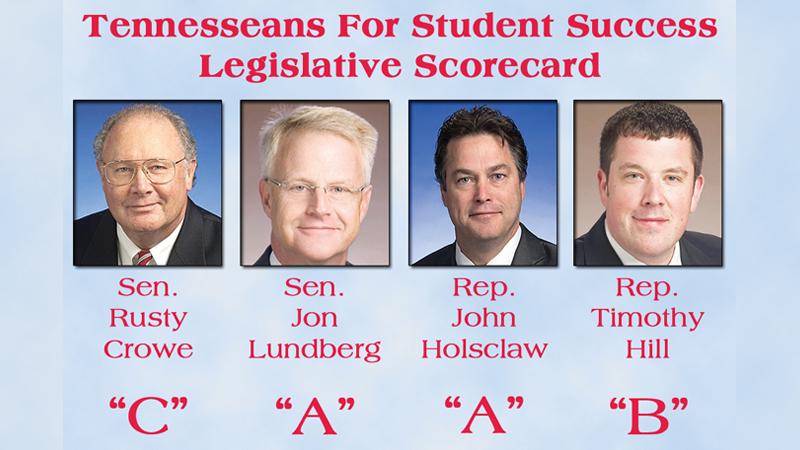Nonprofit agency grades legislators on their support of education
Published 4:51 pm Wednesday, October 25, 2017
Tennesseans for Student Success, a non-profit state-wide organization, recently released their “Legislative Scorecard” for members of the Tennessee General Assembly and some local lawmakers performed better than others according to the agency’s standards.
“Evaluating legislators in an open and honest manner is important,” said Tennesseans for Student Success Board Chairman Austin McMullen. “The SuccessCard clearly and concisely informs voters which members of the General Assembly support the policies that have helped Tennessee become the fastest improving state in the nation in education.”
“By supporting rigorous academic standards, an assessment aligned to those standards, accountability for everyone involved in the classroom, and public choices in education, Tennessee’s legislators are sending a clear signal that education is the priority for Tennessee,” McMullen added.
The mission of Tennesseans for Student Success, according to the organization’s website, is improving student achievement in the state. This is the first year the group has released the legislative scorecard, which they are calling a “SuccessCard,” and McMullen said he believes will aid their mission by holding legislators accountable while keeping voters informed of how their representatives are supporting education.
“As we unveil the SuccessCard and continue to update it each legislative session, we know it will be a helpful tool to help hold Tennessee’s elected officials accountable for student success,” McMullen said. “We know parents, teachers, community leaders, and all those who have a stake in the work done in our classrooms will find this easy-to-navigate SuccessCard a key part of informing their decisions at the ballot box.”
To calculate the legislators’ scores, the agency looked at their voting records when dealing with education issues — particularly matters dealing with Tennesseans for Student Success’ key principals of supporting high academic standards, supporting an assessment aligned to the state’s K-12 standards, supporting an accountability system that incorporates student achievement data to improve teaching and better align a teacher’s professional development program, and supporting public school choice giving parents and students the opportunity to attend a public school that best fits the needs of the child. The agency tracks not only votes on the floor of the Tennessee House and Senate, but also votes cast in committees on the proposed bills.
State Senator Rusty Crowe, who represents a portion of Carter County, was given a grade of “C” by the agency with an overall score of 78 compared to the Senate’s average score of 90.
In the area of standards and accountability, the agency gave Crowe a score of 100 in both of those areas. However, the agency scored him a 0 for the public school choice standard, citing his votes in both the Education Committee and on the Senate Floor against the Tennessee High-Quality Charter Schools Act. The Act was drafted to ensure a transparent process for charter school accountability. The bill passed both houses of the Tennessee General Assembly and was signed into law by Gov. Bill Haslam in May.
State Sen. Jon Lundberg, who represents a portion of Carter County, was given a grade of “A” by the agency with an overall score of 100. According to the scorecard, Lundberg achieved a 100 score in all three standard areas.
State Rep. John Holsclaw Jr., who represents a portion of Carter County, also achieved a grade of “A” by the agency with an overall score of 100, which is higher than the Tennessee House of Representatives’ average score of 95. According to the scorecard, Holsclaw achieved a 100 score in all three standard areas.
State Rep. Timothy Hill, who represents a portion of Carter County, was given a grade of “B” by the agency with an overall score of 88. While Hill achieved scores of 100 in each of the three standard areas, the report notes that Hill was given “demerits” which lowered his overall score. The agency took points away from Hill due to his sponsoring a bill that would have granted local school districts the authority to adopt or create their own standards, assessments, and accountability requirements. Tennesseans for Student Success opposed the bill, claiming it would create inconsistency in public education across the state and endanger a student’s opportunity to succeed. The bill ultimately died after failing to make it out of either the House or Senate’s Education Committee.





